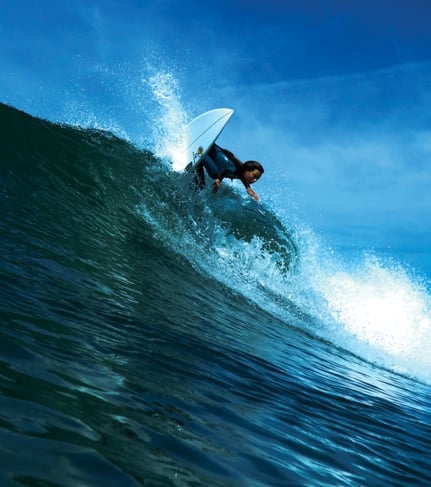
A new wave of athletes is beating old records—swimming more swiftly, lifting heavier weights and running faster. These game-changers are powered by plants.
Say hello to three super-fit (and equally thoughtful) vegan athletes. These ladies started out wanting to try something new, eat better and help animals. They ended up gaining an unexpected fitness edge.

Madi Serpico, Triathlete
Elite triathlete Madi Serpico went vegan for ethical reasons and was surprised by the health effects. “Almost immediately, my energy levels increased,” she says. “My hormones [used] out of balance, and within a month I was feeling like a whole different person.”
Serpico has been a winner or top finisher at the Pan American Cup, Canadian National Championships and more, and she says her plant-based diet plays a key role in her success: “I recover much quicker after a hard workout, and because I’m eating cleaner, my weight doesn’t fluctuate, which helps with consistency in racing and training.”
To fuel up before exercise, Serpico loves gluten-free oatmeal combined with fruit, nuts and flaxseed. “I never go anywhere without it,” she says. “I like eating it in the morning after a hard swim set.”
Curious if a plant-based diet could work for you? “Try a 30-day vegan challenge and you will see how amazing you feel,” Serpico suggests.
Endless possibilities
People often define veganism by what it forbids: no animal products and nothing processed with animal products. But veganism is more about the endless possibilities than the few restrictions. Seventy years ago, animal rights activist Donald Watson coined the word “vegan.” He wrote about wanting the term to convey that “even with all animal foods taboo, nature still offers us a bewildering assortment from which to choose.”
Today, scroll through Instagram’s vegan-related hashtags—#whatveganseat, #poweredbyplants, et cetera—or browse through a bookstore’s cookbook section to reveal mouth-watering vegan dishes for every season and setting, proving animal products aren’t needed for a satisfying meal.

Tia Blanco, Surfer
Tia Blanco was crowned champion at the last World Surfing Games, an accomplishment she also attained in 2015. This sets her up to compete in the 2020 Summer Olympic Games, the first time surfing will appear at the Olympics.
“I’ve been vegan for three years now,” says Blanco. She made the jump after watching Forks Over Knives and similar documentaries on traditional Western diets.
“Prior to being vegan, I ate a lot of dairy products that made me fatigued,” she recalls. “Cutting the dairy helped with my energy levels. I feel lean and toned from a plant- based diet.”
Blanco has become an advocate for a vegan lifestyle, doing ads for People for the Ethical Treatment of Animals and appearing in documentaries like the sequel to Leonardo DiCaprio’s Cowspiracy (2014). “I’m [a] of the team that produces the documentaries, so for me it was a no-brainer to be involved,” she says. “I want [viewers] to take away that eating a plant-based diet will benefit your health.”
5 must-have supplements for vegan athletes
The following nutrients will help you thrive on a plant-based diet.
1. Calcium
Some vegans may struggle to replace the calcium found in dairy products. Fortified plant milks and dark green leafy veggies can help, but a calcium supplement may be your most convenient option.
2. Omega-3s
Found mainly in fish, omega-3s may be lacking in a vegan diet. Take a daily supplement with 300 mg of plant-based DHA.
3. Vitamin B12
It’s primarily found in animal products. Increase your intake of B12 with nutritional yeast, fortified foods or vegan supplements.
4. Iodine
Most North Americans get iodine through dairy or iodized salt. If your diet has neither of these, up your seaweed intake or use supplements.
5. Vitamin D
Fortified foods, like vitamin D-enriched nut milks, are recommended for anyone, no matter their diet. Take vegan vitamin D supplements to make sure you’re getting enough.

Rebecca Soni, Swimmer
Rebecca Soni has won dozens of medals at the world’s top international swimming competitions, including three Olympic gold medals. She switched to a plant-based diet simply to try something new. “I thought it would be a fun challenge,” she says. The positive results were more than she’d imagined.
“The breakthrough was realizing how sluggish animal foods made me, and especially the effect of dairy on my allergies,” she says. “When I dropped the allergy meds I’d been taking for 15 years, I knew I was onto something good!
“I just feel better. My mood is lighter. I’m more ready to take on anything. I feel I can go for longer, whether it’s a run, a swim or anything else. I recover faster—soreness is much less intense and passes quickly. And I have a growing respect and connection to all people and living beings.”
Soni starts every morning with a vegan smoothie, adding superfoods like hemp and chlorella. “The most important is the greens,” she notes, like spinach and chard. “Blended greens are much easier to digest than simply munching on them.”
Soni says the top worry she hears from people is about having to give up cheese. “I was a cheese lover in my past too,” she laughs. “Focus on what you have to look forward to, not what you’re missing out on.”
But how do you get enough protein?
There’s no evidence backing the stereotype that we need animal protein to excel at fitness. The most pervasive myth is that vegans don’t get enough protein. Simply aim for 80 to 100 g of vegetable protein from a variety of sources. For more on that, check out our protein cheat sheet.





